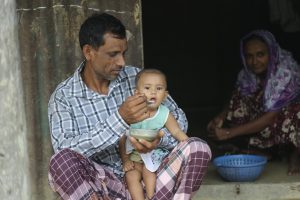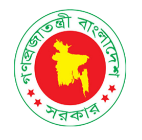The gender stereotype and prominent gendered social norms in rural Bangladesh are no different than the urban areas. To address food security for the poor and extreme poor people in the community, SHOUHARDO III activities seek to understand and transform traditional gender roles, such as-
- The subordinated position of women (particularly young women)
- Patriarchal decision-making systems
- Images of masculinity are associated with dominance and violence .
Early on in the program, SHOUHARDO III applied the CARE model of Empowerment Knowledge and Transformative Action (EKATA), which is basically women’s’ solidarity groups that create a safe space to discuss the challenges to women and girls. In this group women and girls motivate each other, identify ways to strengthen their capacities, enhance confidence in decision-making in the households, and taking up leadership roles in communities. It further allows them to negotiate for a space and link with a broader national organization, alliance, and networks.

The program has learned that working with women only will not achieve the desired societal transformation and thus facilitated men’s and boys’ engagement through sensitizing them while they are on their usual meeting places such as tea stalls and farmer groups to discuss and promote:
- Joint/ Mutual decision making in managing household income
- Budgeting
- Taking care of the female members of their households as well as their children
- sharing of household responsibility to support women mobility
- Involvement in non-traditional employment
- Allowing enough rest time for pregnant and lactating mothers
- Addressing gender-based violence (GBV) by encouraging making careful choices in their daily lives that support and promote positive relations with female counterparts.
A more direct approach to ending GBV at the community level is to motivate and create awareness and initiate actions to prevent, respond to and address GBV. is the female participants are connected with the union level committee on addressing violence – Union Parishad Nari Nirjaton Protirodh Committee which offers services to GBV victims and survivors including and support GBV survivors to seek medico-legal services.
Another initiative to improve household relations is the couple’s dialogue sessions to enhance communication and engage in joint decision-making, in addition to the topics being discussed with men. Already, more than 9,000 couples benefitted from 755 sessions
- The subordinated position of women (particularly young women)
- Patriarchal decision-making systems
- Images of masculinity are associated with dominance and violence to achieve a gender-equitable and just society.
The program has learned that working with women only will not achieve the desired societal transformation and thus facilitated men’s and boys’ engagement through sensitizing them while they are on their usual meeting places such as tea stalls and farmer groups to discuss and promote:
- Joint/ Mutual decision making in managing household income
- Budgeting
- Taking care of the female members of their households as well as their children
- sharing of household responsibility to support women mobility
- Involvement in non-traditional employment
- Allowing enough rest time for pregnant and lactating mothers
- Addressing gender-based violence (GBV) by encouraging making careful choices in their daily lives that support and not harming their female counterparts.
To raise awareness of violence against women (VAW) and prevent reinforcement of harmful social norms, the SHOUHARDO III program started a social media campaign titled, It Ends with Me.
This comprises a social media component that intends to build an active digital community to raise voices against GBV, leading to a movement. The specific objective of the campaign is to implement a social media campaign to end violence and harassment in a woman’s life that is triggered by the complex relationship dynamics with her family and in-laws. SHOUHARDO III has been running this campaign since March 8, 2020, in line with the celebration of International Women’s Day, and reached 12 million people by January 2021 generating awareness, stimulating conversations, and mobilizing support to stop the reinforcement of harmful norms and practices (such as VAW including physical, economic, and psychological violence) by mothers-in-law, with special focus to SHOUHARDO III implementing areas.
“Previously I thought household chores are the responsibility of women only. After attending multiple couple sessions, I not only realized household chores are not for women only but also sharing household chores helps to bring peace to the family. Now, I help my wife with cooking, cleaning, and taking care of our children. Sometimes, I do those by myself also. Now we can spend more time together happily.”
– – Payel Miah from Habiganj


